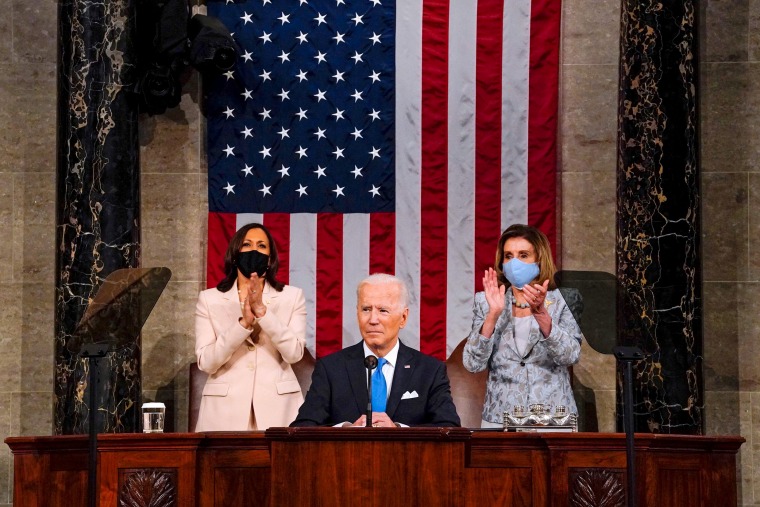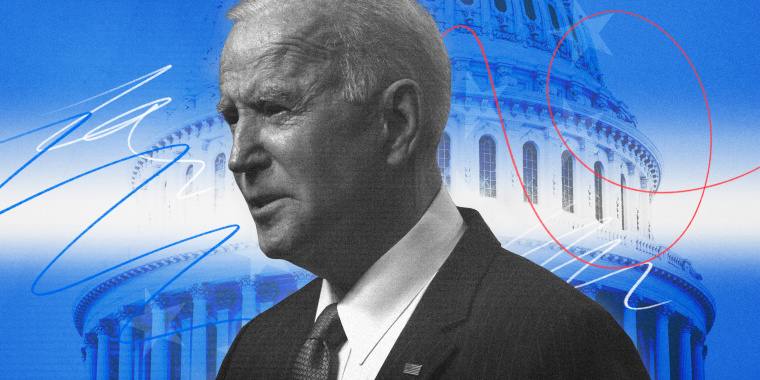WASHINGTON — President Joe Biden painted a nation on the mend, recovering from the pandemic but still in need of a boost from the federal government, in his first address to Congress on Wednesday as he seeks to shift his focus beyond the coronavirus pandemic nearly 100 days into his administration.
Biden said he was there to speak to Congress not just about "crisis" but also about "opportunity," pitching $4 trillion of ambitious investments in the economy and social safety net programs that he argued were necessary to compete on the global stage and said would reduce deficits in the long run.
"Now, after just 100 days, I can report to the nation: America is on the move again," he said.
"We're in a great inflection point in history. We have to do more than just build back. We have to build back better," Biden continued, echoing his campaign slogan.
Biden announced his American Families Plan, a roughly $1.8 trillion package that includes universal preschool, two years of free community college and expanded access to child care. It is the second phase of Biden's two-part push to boost the economy, following the $2 trillion infrastructure and jobs package, which he announced last month.
Biden said he would ask corporations and the wealthiest Americans to "pay their fair share" to fund his economic agenda, arguing that the pandemic had put a spotlight on inequality in the country as millions of people lost their jobs while CEOs' salaries continued to increase and billionaires' net worths rose.
"My fellow Americans, trickle-down economics has never worked," Biden said, promising not to raise taxes on those making less than $400,000 a year. "It's time to grow the economy from the bottom up and middle out.
"When you hear someone say that they don't want to raise taxes on the wealthiest 1 percent and on corporate America, ask them: Whose taxes are you going to raise instead, and whose are you going to cut?" he added.
Biden, who campaigned in part on a promise to restore public trust in government, promoted the American Rescue Plan, vaccination rollouts and his economic proposals as proof of a functioning democracy, adding that autocracies around the globe, including China, were betting that the U.S. would be too divided to pass his sweeping agenda.
"Can our democracy deliver on the most pressing needs of our people? Can our democracy overcome the lies, anger, hate and fears that have pulled us apart?" Biden asked.
"It's time we remembered that we, the people, are the government. You and I. Not some force in a distant capital. Not some powerful force we have no control over," he said.

The joint address typically takes place within a president's first few weeks in office, but it was delayed until the end of April this year as the White House navigated logistical hurdles because of the pandemic.
Ultimately, only around 200 people were allowed in the House Chamber, far fewer than the usual 1,600. Attendees sat socially distanced and were required to wear masks.
Wednesday also marked the first time in U.S. history that two women — Vice President Kamala Harris and House Speaker Nancy Pelosi, D-Calif. — were seated behind the president during an address to Congress. Biden acknowledged the historic moment as he took the podium, saying, "It's about time."
The speech marks a new stage of legislative challenges for Biden. Democrats passed his $1.9 trillion Covid-19 relief package without Republican support, and now they must decide what to do with his newest round of requests.
Biden already faces opposition from Republican lawmakers and some moderate Democrats over his proposal to raise taxes on the wealthiest Americans to fund his proposed programs. With an evenly divided Senate and a thin majority in the House, he has an uphill battle in Congress.
While he focused largely on his economic proposals, Biden also ran through a number of other legislative items, including a $15-an-hour minimum wage, voting rights, gun reform, immigration reform and lowering prescription drug costs, gently encouraging Republicans to work with him.
Biden faced pressure from some liberals to throw more of his political capital behind some of those issues, but he has made it clear that his focus is on his massive economic proposals and a goal to sign the first piece by the end of the summer.
Biden pushed Congress to address the costs of prescription drugs — but he notably left the proposal out of his American Families Plan.
And he said, "I don't want to become confrontational, but we need more Senate Republicans to join the overwhelming majority of Democratic colleagues and close the loopholes required in background check purchases of guns."
Biden also used the speech — which is not called a State of the Union address because it is an inauguration year — to call on Congress to pass the George Floyd Justice in Policing Act by the anniversary of Floyd's murder next month, setting a deadline for the first time.
Delivering the Republican response, Tim Scott of South Carolina — the only Black GOP senator — said that "America is not a racist country" and, similar to Biden, urged the nation to come together.
"We are not adversaries," Scott said. "We are family."

